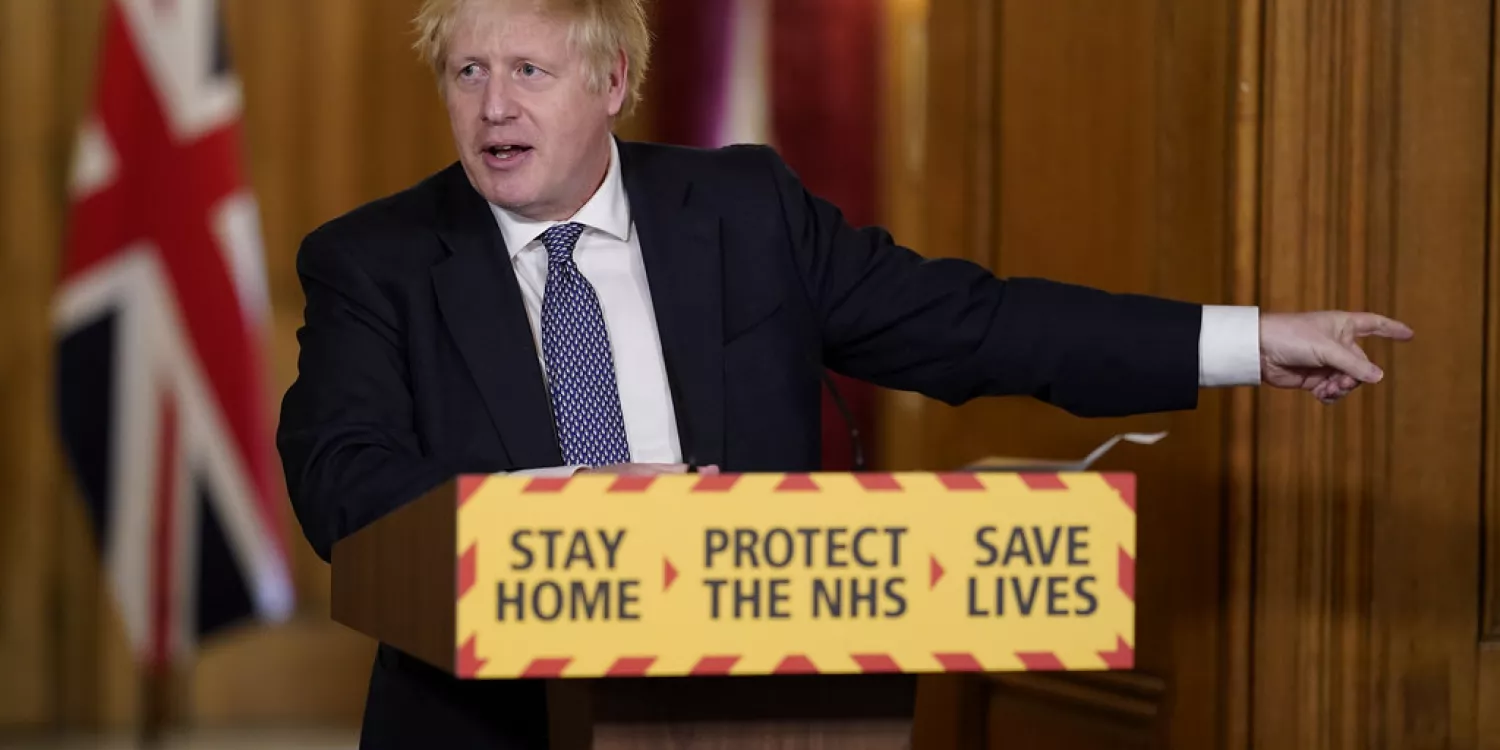In spite of populist Brexiteer promises, science and the state still rule in Britain
The UK government’s approach to the pandemic has been poor, but the bridgehead has not yet been built to the destructive mania of Trumpian conservativism

Image: Andrew Parsons / No 10 Downing Street
Ever since the Brexit vote in 2016, it has been commonplace to situate Leavers within a global growth in right-wing populism. That Trump welcomed the Leave victory and at least some Leavers returned the love, suggests a common purpose. Now that we have a Conservative government seemingly dedicated to a very hard Brexit, led by a prime minister who has a history of wilful incompetence and a flexible attitude to the truth, it’s even more tempting to conflate Johnson and Trump.
However, the Covid-19 pandemic has actually revealed the differences between Trump and Johnson, as well as deeper discontinuities between right-wing populism in the UK and US.
This may seem like a counter-intuitive argument. After all, while the full story is only gradually emerging, there are ample reasons to question the government response: The confusion over strategy in February and March (particularly over ‘herd immunity’), Johnson’s early insouciance, the delay in announcing the lockdown, PPE shortages, lack of widespread testing. A decade of Tory austerity has also had an impact on the ability of the NHS and care system to cope with the virus.
Yet a look across the Atlantic reveals how much worse the UK response could have been. Johnson eventually tried hard to adopt a sober and serious tone.
He has not blamed the media for everything; he has not only appeared alongside scientific advisors in press conferences, he has avoided trying to steal their limelight or pushing them to investigate quack cures; he does not seem to be pushing for a premature end to the lockdown; and he has empowered chancellor Rishi Sunak to roll out significant aid to employers and employees.
There may be a poverty of expectations here. I am simply suggesting that Johnson and his government have acted with a minimum level of competence and seriousness. Yet the reason why this is noteworthy is because this was not what we were promised.
The tobacco industry strategy of insisting that the science is uncertain became the template for climate change denialism
We were promised a government that would be led by someone who would avoid scrutiny, eschew seriousness and take a relaxed attitude to the truth. We were promised a government that would take on the civil service. And above all, we were promised a Brexit so hard that it would cause a radical economic shock, with all the suffering that that implies.
It is likely that eventually there will be a ‘pivot’ back to the principle of governing through destruction and deliberate incompetence. For now, though, it is worth asking why Johnson and the UK government failed to address the pandemic as their counterparts in the US government did.
The Trump administration represents the triumph of a decades-long effort to undermine scientific expertise and its place in government. As historian of science Naomi Oreskes, amongst others, has shown, the work of the tobacco industry from the 1960s to cast doubt on evidence for the harm that smoking causes, acted as a kind of bridgehead for the infiltration of science-denying corporate interests into government.
The “tobacco strategy” of insisting that the science is uncertain, became the template for climate change denialism. Well-funded think tanks and lobby groups, such as the American Enterprise Institute and the Heritage Foundation, developed deep roots in the Republican party, supplying multiple members of the Bush and Trump administrations.
The normalisation of science denialism in the Republican Party has helped to create the conditions in which Trump can govern through deliberate incompetence, and the gutting of state support and expertise. Further, he can also count on a base of voters that have internalised the message that knowledge and evidence-based social policy are an enemy to be resisted.
In contrast, the UK history of science denialism is much more recent and less established. As DeSmog UK has shown, the Leave campaign was intimately connected to UK and US organisations and individuals promoting climate change denialism.
55 Tufton Street in Westminster is home to the prominent climate change denialist outfit the Global Warming Policy Foundation, small-state advocates the Taxpayers’ Alliance (who are connected to US denialist organisations such as the Competitive Enterprise Group), as well as pro-Brexit groups such as Business for Britain and Leave Means Leave.
While Farage and the Brexit Party did seem to embrace a US-style distrust of science, the Conservative Party is still a work in progress. Climate change denialism is still not normative in the party, although apathy very much is. And while the likes of Dominic Raab and Priti Patel appear to be sympathetic to an anti-state agenda, Johnson himself veers between libertarianism and one-nation Toryism.
Campaigns to incite a grassroots revolt against the lockdown have not taken off
The Conservative Party also has to function within a country in which the state, in the form of the NHS, is not something to be resisted. US-style rallies to open up the economy have had only the most marginal support over here and despite the efforts of Toby Young to encourage “scepticism” about the lockdown, campaigns to incite a grassroots revolt against the lockdown have not taken off.
So Johnson and the UK government do not have the political wriggle-room to embrace Trumpian ignorance and destruction. The UK right has not yet been entirely “captured” by science-denying corporate interests. They have no choice but to attempt to address the pandemic seriously.
All this tells us something important about Brexit: The success of the Leave campaign did not represent the conversion of the UK right – and still less the wider electorate – to Republican-style populism. Indeed, the Leave campaign itself was a coalition that included serious policy wonks and left-wing activists; it was not entirely reducible to its anti-state right-wing elements.
Brexit has only acted as a bridgehead for the infiltration of Republican-style politics to the UK. As the US example shows, it takes decades to expand out of this bridgehead. At the moment, the UK is not ready to be governed by those who promote wilful ignorance and the gutting of the state. The electorate has only consented to this style of government in the pursuit of Brexit. For that reason, the Tories have no choice but to treat the challenge of Covid-19 differently to the challenge of Brexit.





